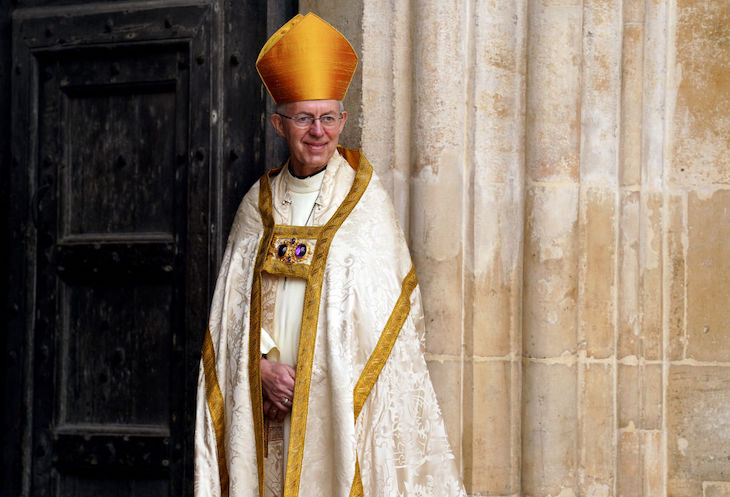At the Church of England’s General Synod on Wednesday morning, I had a good view of the sign-language person. In a bored moment (sorry for the puerility), I tried to see what the sign for ‘sex’ was. I failed to discover this, but happened to be watching him while an evangelical spoke of progressive teaching leading people to hell. He made a pleasing little one-handed goat-horn sign.
The whole debate could have been summed up in a couple of gestures. Maybe a sad face and heart sign, for the progressives’ tireless emphasis on the pain and exclusion of homosexuals, and the need for loving acceptance. For the evangelicals, maybe a clenched-fist hold-fast sign, plus a Bible, followed by the old goat-horns.
I’m a liberal, but the rhetoric of my fellow liberals did not often fill me with theological delight. Speaker after speaker, some of whom sported brightly dyed hair, expressed indignation that reform was taking so long, that gay people were still cruelly disadvantaged. Allowing blessings for same-sex couples is a matter of simple decency, they implied, and an obvious expression of Christian love.
The CofE is presumably inching towards full acceptance of homosexuality
I don’t think this is quite the right approach. In reality they are seeking a major change in the Church’s teaching – a move away from its doctrine of marriage. The argument for such a change should be made clearly and honestly, and expressions of hurt should be kept to a minimum. On one level, I found myself sympathising with the conservatives, who kept pointing out that this supposedly minor innovation would weaken the old doctrine of marriage and so should be subjected to fuller scrutiny.
Rather surprisingly, Synod voted to press ahead with its original plan of allowing same-sex blessings, for an experimental period. The Church’s teaching is now inconsistent. Sex outside of straight marriage is still officially condemned, and gay clergy are still told to be celibate. But blessings for gay couples will soon be officially approved, and in a few months new ‘pastoral guidance’ is expected to say that gay clergy can get married (outside of churches), and to imply, through tactful silence, that their sex-life is their own business.
For years, the Church has been in unofficial limbo. It has condoned a subculture in which homosexuality is affirmed, even celebrated, in defiance of the rules. For some years, liberal clergy have already been blessing gay unions, and none has ever been sanctioned. This explains the impatience of the liberal campaigners: we just want acknowledgement of the actual reality on the ground, they are saying.
Now it is in official limbo. It is presumably inching towards full acceptance of homosexuality, but its leaders are determined to deny this: the doctrine of marriage is entirely safe, they say, straight-faced. Of course they are kicking the can down the road. Sooner or later, Synod will have to have a more honest debate, in which a new teaching on sex and marriage is forged.
Liberals must up their theological game, and start explaining why the conservative case is deficient. It’s not enough to say that love and acceptance trumps bigotry – that sounds too secular. The way forward is to rediscover a Protestant theme: the freedom that the Gospel brings, meaning the freedom from specific moral rules. It’s an unfashionable emphasis, because it has links with anti-Catholic and indeed anti-Jewish attitudes, but it’s a crucial resource in the challenging of the Puritan mindset. It is the only way that liberals can get theologically serious. They must start accusing the conservative evangelicals of legalism.







Comments